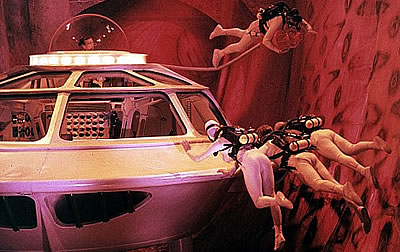Science Fiction
Dictionary
A B C D E F G H I J K L M N O P Q R S T U V W X Y Z
Who Needs Asimov's 'Proteus' When You Can Have Pangolins?

Science fiction fans have longed for a personal Proteus, the miniaturized ship from the 1966 movie Fantastic Voyage. Inside the body, it could guard against any number of internal enemies.

(Proteus from Fantastic Voyage)
Given that the Proteus is pure fiction, though, maybe you'd settle for a pangolin?
Researchers in Germany have developed a small robot that can deliver drugs to specific locations in a patient’s (in this case) digestive tract and then be unfolded via externally applied magnetic fields.The clinical uses for miniature, untethered magnetic robots are still limited because the devices mainly rely just on mechanical interactions with the body, instead of also using, say, heat. Magnetic fields can also remotely supply energy to robots for heating. However, magnetic fields are best at heating rigid metallic parts, and such components generally take away the advantage of having a soft body.
Now scientists have developed a tiny magnetic robot that combines hard and soft by drawing inspiration from the pangolin. The animal, which resembles a walking pine cone, is the only mammal completely covered in hard scales. However, the pangolin is still capable of flexible motion—it can arrange its scales so that they overlap, letting it curl up into a ball in case of danger.
(Via IEEE Spectrum.)
Scroll down for more stories in the same category. (Story submitted 7/5/2023)
Follow this kind of news @Technovelgy.| Email | RSS | Blog It | Stumble | del.icio.us | Digg | Reddit |
Would
you like to contribute a story tip?
It's easy:
Get the URL of the story, and the related sf author, and add
it here.
Comment/Join discussion ( 0 )
Related News Stories - (" Medical ")
Bone-Building Drug Evenity Approved
'Compounds devised by the biochemists for the rapid building of bone...' - Edmond Hamilton, 1932.
BrainBridge Concept Transplant Of Human Head Proposed
'Briquet’s head seemed to think that to find and attach a new body to her head was as easy as to fit and sew a new dress.' - Alexander Belaev (1925)
Natural Gait With Prosthetic Connected To Nervous System
'The leg was to function, in a way, as a servo-mechanism operated by Larry’s brain...' - Charles Recour, 1949.
Brain Implant Is Able To Capture Your Inner Dialogue
'So you see, you can hide nothing from me.'
Technovelgy (that's tech-novel-gee!) is devoted to the creative science inventions and ideas of sf authors. Look for the Invention Category that interests you, the Glossary, the Invention Timeline, or see what's New.
Science Fiction
Timeline
1600-1899
1900-1939
1940's 1950's
1960's 1970's
1980's 1990's
2000's 2010's
Current News
The New Habitable Zones Include Asimov's Ribbon Worlds
'...there's a narrow belt where the climate is moderate.'
Can One Robot Do Many Tasks?
'... with the Master-operator all you have to do is push one! A remarkable achievement!'
Atlas Robot Makes Uncomfortable Movements
'Not like me. A T-1000, advanced prototype. A mimetic poly-alloy. Liquid metal.'
Boring Company Drills Asimov's Single Vehicle Tunnels
'It was riddled with holes that were the mouths of tunnels.'
Humanoid Robots Tickle The Ivories
'The massive feet working the pedals, arms and hands flashing and glinting...'
A Remarkable Coincidence
'There is a philosophical problem of some difficulty here...'
Cortex 1 - Today A Warehouse, Tomorrow A Calculator Planet
'There were cubic miles of it, and it glistened like a silvery Christmas tree...'
Perching Ambush Drones
'On the chest of drawers something was perched.'
Leader-Follower Autonomous Vehicle Technology
'Jason had been guiding the caravan of cars as usual...'
Golf Ball Test Robot Wears Them Out
"The robot solemnly hit a ball against the wall, picked it up and teed it, hit it again, over and again...'
Boring Company Vegas Loop Like Asimov Said
'There was a wall ahead... It was riddled with holes that were the mouths of tunnels.'
Rigid Metallic Clothing From Science Fiction To You
'...support the interior human structure against Jupiter’s pull.'
Is The Seattle Ultrasonics C-200 A Heinlein Vibroblade?
'It ain't a vibroblade. It's steel. Messy.'
Roborock Saros Z70 Is A Robot Vacuum With An Arm
'Anything larger than a BB shot it picked up and placed in a tray...'
A Beautiful Visualization Of Compact Food
'The German chemists have discovered how to supply the needed elements in compact, undiluted form...'
Bone-Building Drug Evenity Approved
'Compounds devised by the biochemists for the rapid building of bone...'
